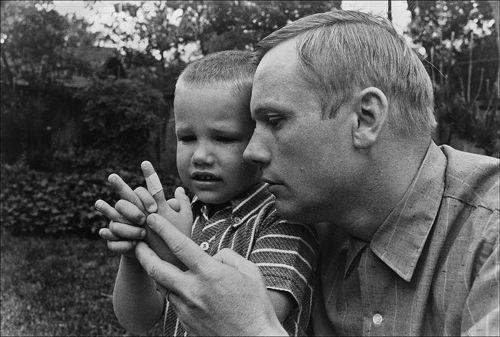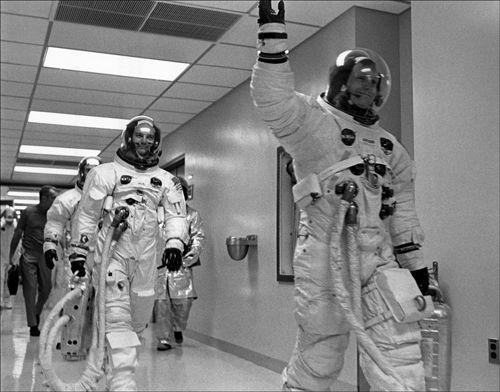Neil Armstrong: A Life of Flight (32 page)
Read Neil Armstrong: A Life of Flight Online
Authors: Jay Barbree
Tags: #Science, #Astronomy, #Biography & Autobiography, #Science & Technology

Tom, John, and Gene locked the route pioneered by
Apollo 8
into
Apollo 10
’s computers and headed home. (NASA)
NASA announced on June 11, 1969, that the
Apollo 11
astronauts had received the go-ahead for a launch attempt July 16, with the first historic landing scheduled for Sunday afternoon, July 20.
* * *
Nine hundred miles north northeast of NASA’s Manned Spacecraft Center, in Wapakoneta, Ohio, Viola Armstrong, Neil’s mother, was doing housework when her radio reported, “Neil Armstrong and his
Apollo 11
crew has been given the go-ahead to attempt the first historic landing on the moon in July. The announcement was made…”
Tears suddenly filled Viola’s eyes as she sank to her knees shutting out the radio’s voice. She had long ago, even as a young teenager, given her life to Jesus Christ, and prayer for her was a daily practice. Suddenly hearing the announcement with her own ears, she was praying—praying as earnestly as she had ever prayed before that God would ride with her son, would protect those three young men all the way to the moon and back, and once she had fully asked the Lord for His protection and she was satisfied Neil’s trip to the moon was God’s will she climbed from her knees and called Steve, Neil’s father.
She had never before been more proud.
* * *
While his mother went about reporting the news to family and friends, Neil was bracing himself to face the media.
NASA’s policy was for each crew to hold a news conference approximately a month before launch and then sit for one-on-one interviews with the radio and television networks, the wire services, and the major papers like
The New York Times.
Neil hated every moment of it. He simply wished reporters would let him direct his efforts at doing a safe and thorough job. The reporters who were Neil’s friends knew the rules, and we lived by them. If you’d like his opinion the conversation was off the record, giving him the opportunity to consider your question freely. Then, if Neil told you something you considered news you asked permission to use it. Generally he gave his permission or gave you a reason why he couldn’t.
NASA wanted to parade their astronauts before the public who was paying the bills, and reaching for the moon was a big bill. Neil knew he was riding on the taxpayer’s dollar and, what the hell, he tightened his jaw and went along with the “dog and pony show.”
First, Neil was asked, “Can you think of anything in which you aren’t prepared?”
“The unexpected,” he said confidently. “You’ve got to expect some things are going to go wrong, and we always need to prepare ourselves for handling the unexpected. We just hope those unexpected things aren’t something that we can’t cope with.”
Another question was, “Will you take personal mementos to the moon?”
“If I had a choice, I would take more fuel,” Neil answered with his one-of-a-kind grin.
“Will you get to keep a piece of the moon for yourselves?” another asked.
“At this time, no plans have been made.”
The pattern of the news conference took shape in the form of quick questions with quick responses and Neil was feeling pretty good until he was cornered with
the
question: “Why should we spend the money to go to the moon?”
Neil shifted in his seat, and then looked directly at the reporter. “I think we’re going to the moon,” he said firmly, “because it’s in the nature of the human being to face challenges. It’s by the nature of his deep inner soul. We’re required to do these things just as salmon swim upstream.”
Neil and Buzz and Mike made it through the media’s gauntlet and soon training was over and
Apollo 11
’s astronauts were packing lots of underwear. They had a trip to make with NASA furnishing flight coveralls and million-dollar spacesuits with special boots and gloves. Underwear and socks were just about all they needed along with a toothbrush or two.

Before leaving for the moon, Neil took care of more important things, such as wiping tears and caring for a cut on son Mark’s small finger. (NASA)
SEVENTEEN
THE LAUNCH
Apollo 11
’s astronauts spent July fourth with their families before flying to the Cape. They were already in their 21-day, prelaunch quarantine to make sure they weren’t exposed to some showstopping germ when their bosses strolled in wearing hospital masks.
The man with the most experience in spaceflight, Chris Kraft, asked, “Have we missed anything, Neil?”
“Nothing, Chris,” Neil answered. “It’s all been done. All that’s left is the countdown.” Kraft appreciated the confidence, and he agreed with Neil. If there was anything that hadn’t been done, not a member of the launch team could say what it was. Kraft knew the equipment was ready. He knew the ground crews, the flight controllers—yes, the astronauts were …
Apollo 11
was the most ready mission ever. He just wanted to make sure Neil didn’t know something he didn’t.

The
Apollo 11
-Saturn V stack loomed awesomely before sunrise. (NASA)
Then Apollo Director George Low had a question. “When you step off the ladder have you thought about what you’re going to say, Neil?”
Neil took a measured, thoughtful moment. He was being questioned by the big boss and tact was demanded. The truth was he did have something to say in mind. It was also true he had not made a final decision. Neil had run it by his brother Dean and a couple of others close to him, and he told the big boss, “Sure, George, I’ve been thinking about it,” adding a smile and quickly changing the subject. “Please tell all the hands that touched
Apollo 11
, all who worked so hard and for long hours, we appreciate it. This is their launch. Tell them they’ll be riding with us all the way.”
* * *
Three days before heading to the moon Neil had only a glimpse of the crowd gathering on the beaches and roadways, congregating in any place that brought them within eyesight or earshot of America’s spaceport. A site with a clear view of
Apollo 11
’s launchpad was premium. There wasn’t a room for rent in central Florida. It had come down to private families renting sofas, cots, even hammocks to anyone who wanted or felt like they had to be there. Neil thought he understood but he felt it was a lot to endure to see them leave for the moon.

The crowd of a million that came to witness Neil, Mike, and Buzz head for the first-ever moon landing found it easier if they came in their own car, RV, or camper. They squatted on beaches, roadways, and water edges surrounding the moonport. (NASA)
On the morning of launch Neil and crew were told the crowd had swelled to more than a million. Some 1,000 police officers, sheriff deputies, state troopers, coast guard, and marine patrol were struggling to keep the masses orderly. These keepers of the law had an estimated 350,000 vehicles and boats moving on the roads and waterways. Helicopters ferried VIPs to reserved bleachers and choice locations. NASA had invited 20,000 in all including Vice President Spiro T. Agnew, half of congress, representatives from the largest and smallest countries; but it was such notables as movie stars Jimmy Stewart and Robert Redford, and aviation heroes Charles Lindbergh and Chuck Yeager, that brought Neil a warmth of feel-good.
There was no one he admired more than Lindbergh, and Neil was most appreciative the great aviator had come. He was also grateful for one particular boat choking the larger waterways that were filled with celebrities’ yachts and large cabin cruisers. On board one of the most luxurious vessels owned by North American Aviation, builders of the Apollo command and service modules, were his wife Janet and their sons Rick and Mark. Neil knew they were being well cared for as were his sister June and family, and his brother Dean and family, who were under NASA escort and secure within Florida’s largest recorded gathering.
In Wapakoneta, the streets were virtually empty. Its 6,700 residents sat before their televisions, and at 912 Neil Armstrong Drive, the home of Neil’s parents Viola and Steve, television networks had replaced their black-and-white set with the largest color television available.
Neil was happy his parents had attended his
Gemini 8
launch. They had been here to witness
Apollo 10
’s liftoff, too. But with the size of the crowd for
Apollo 11
, he was pleased his parents were staying home. He would later learn a reporter counted overnight 233 cars driving by their house.
* * *
Despite the crowds and all the excitement, the morning for Neil, Mike, and Buzz was all about going to the moon. Their day had begun three-and-a-half hours before liftoff when suit techs had dressed them in their spacesuits and helmets. From that moment forward,
Apollo 11
’s astronauts would be breathing manufactured oxygen—no outside air—until they returned in eight days. And when Neil led them from their crew quarters to their transport van to take them to their launchpad, he felt he belonged. Somewhere deep inside Neil was a lifetime feeling that his destiny was to take a “Lindbergh” step in flight. At least he hoped it was.
On their ride to the pad Neil reminded himself it all could have unfolded differently. It could have been Alan Shepard, Gus Grissom, Pete Conrad, Jim Lovell, or some other astronauts. But it wasn’t. It was him and Mike and Buzz and he knew they had to get the job done. He glanced across the van at his two crewmates. He sensed they, too, had the same knowing. Like all their assignments before, they had gotten their jobs done, and going to the moon wasn’t about the crew anyway. It was about science. It was about advancing science, humans leaving their planet, leaving their cradles, following their destiny to explore and settle new places beyond Earth, advancing knowledge. Neil was satisfied.

A smiling Neil Armstrong leads the way from their crew quarters to the launchpad. (NASA)
He felt good about how everything had come down and when their transfer van reached their launchpad, he walked toward the elevator stopping before the lift that would take them to level 34. That’s where the spaceships they’d named Columbia and Eagle waited. Neil had promised his mother he would give thanks before they lifted off for the moon, and he did.
